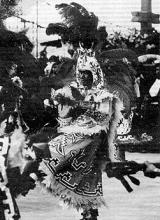Barbarians and Indomitable
In 1554, the Jesuit priest Anchieta referred to the Indians, declaring “them to be such barbarians and so fearless (...) that they seemed closed to the nature of the beasts than to man”. Years later, in 1562, his desillusion was even bigger: “(...) for this kind of people there is no best sermon than the sword and an iron bar (...)”.
From the projection of their own repressed wishes, those Jesuits see the Indians as burdened with sin, when they lived with pleasure ans without shame. They tried to save them from their original values, destroying their mediators.
Bartolomé de las casas, Dominican friar, writes in 1542 by his 40 years old: “Everything that’s being commited at the indies regarding the Indians is unfair and tyrannical. “The Indians die before time”.
Bartolomé spends the rest of his life in defense of the Indians, arising the hatred of the “conquerors”. Dies at the age of 92, as the Bishop of Chiaspas.
Anchieta thus referred to the Pajé:
“The old mistake lies down on earth, he takes care of the herd. Now the dogs of God, whose barking frightens. Angry and traitor Wolves. If one day the Guard’s hands should tie you, you will moan in a revengeful fire. Or you will pay in a dirt prison the deserved punishment...”
The Indians were strong and healthy. The Portuguese arrived in dirty ships, full of unknown illness. Indian medicine was superior to the European, but it couldn’t stop the epidemics that crossed the seas.
![Spanish colonization in the 16th century. (B. de las Casas, NARRATIO REGIONUM INDICARUM PER HISPANOS [...], Frankfurt-am-Main, 1598, illustrated by De Bry)](/sites/default/files/styles/medium/public/barbaros_e_indomitos_1_0.jpg?itok=IzZytf_J)

![B. de las Casas, NARRATIO REGIONUM INDICARUM PER HISPANOS [...], Frankfurt-am-Main, 1598, illustrated by De Bry](/sites/default/files/styles/medium/public/barbaros_e_indomitos_3_0.jpg?itok=tUVlcBZu)